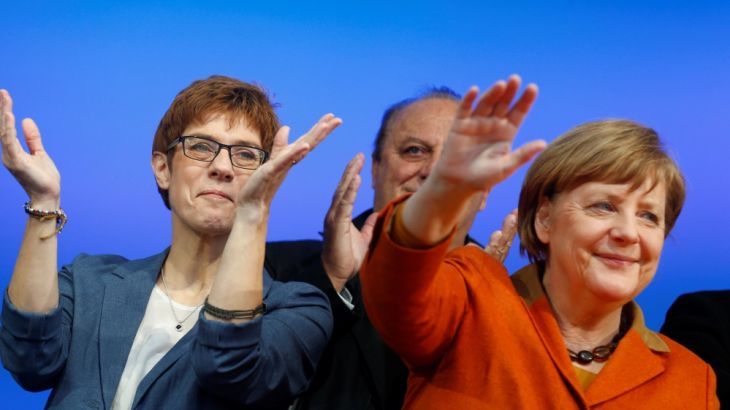
Big gains for Merkel’s party as German election year starts
Christian Democrats increase share in Saarland regional vote, in a boost for chancellor before national vote in September.
German Chancellor Angela Merkel‘s conservatives have strengthened their position as the largest party in a regional vote, bolstering her prospects of winning a fourth term in September’s national election.
Merkel’s Christian Democrats (CDU) on Sunday won western Saarland state with 41 percent of the vote, up from 35.2 percent in the last election in 2012, according to an exit poll for broadcaster ARD.
Keep reading
list of 4 items‘Absolute power’: After pro-China Maldives leader’s big win, what’s next?
Solomon Islands pro-China PM Manasseh Sogavare fails to secure majority
Pro-China party on course for landslide victory in Maldives election
The CDU’s close rival, the Social Democrats (SPD) led by Martin Schulz, won 29.5 percent, down from 30.6 percent.
READ MORE: Angela Merkel to seek fourth term as German chancellor
“This is, of course, a really great start to the election year of 2017,” Michael Grosse-Broemer, one of Merkel’s top deputies in parliament in Berlin, told ARD.
Saarland, a region of nearly one million people on the French border, is currently run by a “grand coalition” of the two big parties, similar to Merkel’s governing alliance in Berlin.
Pre-election polls had suggested a significantly tighter race and indicated that the SPD might be able to form a new left-wing coalition in Saarland.
That appeared highly unlikely, as the opposition Left Party – which is traditionally strong in the region – won some 13 percent and the left-leaning Greens looked set to fall short of the five percent needed to keep its seats.
‘Vindication for Merkel’
The Saarland election on Sunday was the first of three regional votes in advance of the September 24 federal vote, and as such offered an opportunity for the parties to build – or lose – momentum in their quest to prevail at the national level.
Al Jazeera’s Dominic Kane, reporting from the state capital of Saarbrucken, said Sunday’s result offered a boost to Merkel.
|
|
“Today is a celebration for Merkel,” he said. “This can only be seen as a vindication” of her policies.
Merkel, who has headed three consecutive governments since 2005, has come under fire for her decision to open the country’s borders to hundreds of thousands of refugees in 2015.
She has also been accused of shifting her party to the left of the political spectrum and co-opting some of the SPD’s core messages, thereby strengthening the rise of the right-wing AfD.
A loss for her at Saarland would have been a worrying signal for the national campaign and for two bigger state elections in May – in Schleswig-Holstein and Germany‘s most populous state, North Rhine-Westphalia, both now led by the SPD.
Al Jazeera’s Kane said Merkel will now need to “go back to the drawing board, and think of what strategies they can use that might win more votes, particularly come September”.